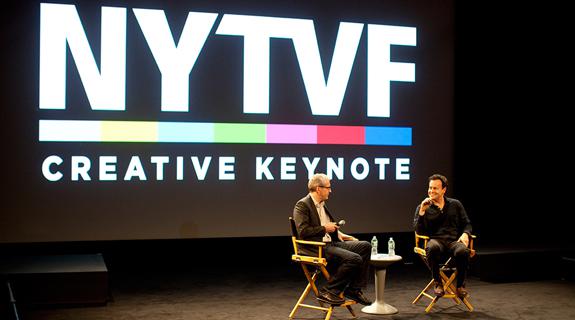Carlton Cuse, show-runner for TV hits such as ABC’s Lost, A&E’s Bates’ Motel and FX’s The Strain, on Tuesday night let New York Television Festival audiences in on what 28 years in television has taught him.
Interviewed by the chatty Andy Borowitz — a writer for The New Yorker writer, comedian and long time friend of Cuse during the festival’s Creative Keynote session — Cuse said adaptability has been key.
To highlight this, Borowitz made a point to clue the audience in to Cuse’s pre-Lost work, though most of them didn’t seem to need it. The duo joked about some of his earliest gigs, which didn’t have quite the pedigrees of Cuse’s more current ouvre: He was a writer on a TV movie starting Amy Grant and Art Garfunkel called Headin’ Home for the Holidays; he worked with Don Johnson on Nash Bridges; and he produced the science fiction- western hybrid, The Adventures of Brisco County Jr.
“Is nothing out of your wheelhouse?” Borowitz asked.
It’s that flexibility, Cuse implied, that has made his career so long and fruitful. It applied directly to his work on Lost.
“I was at another studio when Damon Lindelof asked me for advice on Lost. I took a leap based on passion and called my agent to get me out of my studio deal so I could work on this show that ABC had only bought 12 episodes of,” Cuse said. “We thought, ‘Okay, let’s just make the coolest 12 episodes we can make’, but we would have been happy if it had ended up as just a DVD that was passed from nerd to nerd.”
Of course, that is not the way it ended up and Cuse had his first hit in the Internet era, with fans everywhere constantly commenting and weighing in. Again, Cuse suggested that adaptability was key.
“The biggest fear from fans was ‘Do you guys know where this is going?” Cuse said, “but the nature of the creative process is to make it up as you go along. We had great plans for Mr. Eko, but it turned out Adewale Akinnuoye-Agbaje did not want to be on Lost, so we had to truncate his character. Michael Emerson’s character was meant to make a three-episode guest appearance and we ended up writing him in as a regular. I think anyone who claims to know where something is going the whole time is not being honest.”
While discussing the current “golden age of television” the audience also got a sense of how Cuse has evolved both his writing and producing style as well helped to evolve the medium overall.
“We broke a lot of rules when making Lost,” he said, citing the show’s enormous cast of main characters and its dark and enigmatic storylines.
“TV is a lot less formulaic now. There were really hard and fast rules before and it’s not that way anymore. There was a lowest common denominator approach and you would get notes that said ‘Be more explicit, explain more.’ Now it’s not important to be everyone’s favorite show, but to be someone’s favorite show.”
Something that changed about his writing style during that period, he said, was that he became more focused on characters and less on plot, something that young TV writers should consider.
The biggest mistake Cuse sees in scripts today is “being too plot-oriented and letting that drive your storytelling. When I veer away from what the character’s desires are and toward what I want them to do, that is when I make mistakes. Come up with a great character and what they want. I learned later in my career how valuable that was.”
Looking ahead, Cuse is working on Point of Honor, a show about the American Civil War that is a coproduction between ABC and Amazon Studios.
“You’ll be able to review it on Amazon.com right along with books and blenders,” he laughed.
Tags:













































__twocolumncontent.jpg)











